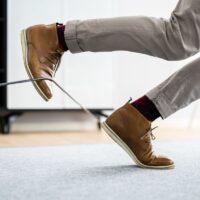Trip and Fall vs. Slip and Fall

Although often discussed at the same time, “trip and fall” accidents are not the same as “slip and fall” accidents. Both types of incidents can cause serious injury, and if they happen on someone else’s property, both can lead to liability for the property owner. It’s important to understand the difference, however, in order to build the best case for your claim. Read on for a discussion of the differences between trip and fall vs. slip and fall cases. For help recovering compensation after any type of accident, talk to a seasoned NYC premises liability attorney at the law office of Leandros A. Vrionedes, P.C.
Defining a “Slip” vs. a “Trip”
Both “slip and fall” and “trip and fall” accidents involve encountering a hazard while on foot, with that hazard causing the victim to fall to the floor or ground. A slip and fall accident generally occurs when a person falls over as a consequence of stepping onto a slippery surface. The slippery surface may be a wet or icy floor, a freshly waxed or cleaned floor, a cold, hard surface with condensation, a low-friction or loose carpet, etc. Typically, there’s some sort of wet substance that causes the victim to slip.
A trip and fall refers to an accident in which the victim trips over an object on the floor and is not able to bring their other foot forward fast enough to prevent a fall. The victim may trip over a crack in the sidewalk, an uneven floor or pavement, a bump in the carpet, a discarded object (brooms, ropes, construction equipment, boxes, etc.), a loose wire, or any other object with enough grip to catch the victim’s foot.
Injuries Common to Trips vs. Slips
Slips and trips can both cause serious, painful, and debilitating injuries. However, different types of injuries are more common in each type of accident.
In particular, when someone trips over a wire, carpet, or discarded object, they are likely to fall forward. When you fall forward, you’re more likely to throw your hands out in front of your face to catch your fall. You might or might not succeed in breaking your fall, but you’re more likely to land on different parts of your body. As a result, trip and fall accidents are more likely to result in:
- Broken fingers
- Broken elbows
- Hand and wrist strains and sprains
- Fractured Ankle
- Broken shoulder
- Broken nose
- Fractured eye socket
- Ocular damage
- Foot fracture
- Cuts, lacerations, and abrasions
- Traumatic brain injury
- Neck injury
Slip and falls are slightly different. When you slip on a slippery surface, it’s more likely that your legs shoot out in front of you, causing you to fall backward. You might get the chance to drop your hands behind you to break the fall, but they will be in a very different position than when falling forward. As a result of falling backward, injuries common to slip and falls include:
- Cranial damage
- Spinal cord damage
- Traumatic brain injury
- Sprained ankles
- Wrist sprain or break
- Hip dislocation or fracture
- Shoulder breaks, tears, dislocations, and sprains
Slip and fall victims are more likely to strike their heads on the ground, causing head trauma and traumatic brain injury. Trip and fall victims have a better chance to get their hands out in front, leading to more broken bones and possible neck injury, but a reduced chance of head trauma. Both, however, carry a serious risk of catastrophic injury. Certainly, many people hit their heads while tripping, and many people fracture their wrists while slipping.
Trusted Advice and Representation for Your New York Slip and Fall or Trip and Fall Claim
If you or someone you care about has been seriously hurt in a New York City slip and fall, trip and fall, or other incident on someone else’s property, find out if you’re entitled to monetary damages for your injuries by contacting the professional and experienced New York premises liability lawyer Leandros A. Vrionedes for a free consultation at 212-889-9362.
